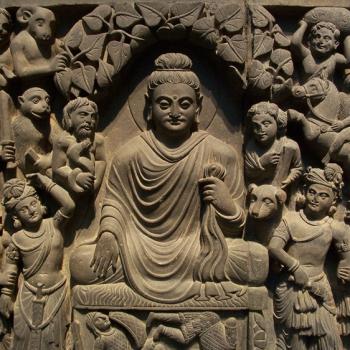How do the ways of women in the daily activities, communities, relationships, and vocations that make up our lives remind us of who God is, and where God might be found?
Cornering God is a column about the challenge and invitation to sniff out the holy in the day to day, to corner the sacred in the public and private spaces that make up the lives of women. Of course, the idea of cornering God is foolish to say the least but most transformative adventures require a good dose of impracticality and let's face it, foolishness. However, to keep things somewhat in perspective, yes, we pursue God because God first pursues us.
Recently, while visiting the 30 Americans art exhibit at the North Carolina Museum of Art, I came upon an arresting quote attributed to Wangechi Mutu (1972-). "Females carry the marks, languages, and nuances of their culture more than the male. Anything that is desired or despised is always placed on the female body." Mutu, a young Kenyan woman trained as a sculptor and anthropologist, uses various media to parse out what being female has meant in different cultures. Mutu's body of work offers thought-provoking socio-political commentaries on issues of gender, culture, and race. But for this column's purposes I am drawn to the notion of women as bearers of meaning. Perhaps because for the past couple of years I also have been reflecting on what it means to be created in the image of God as a woman, with all my assumed female ways and proclivities.
Since I chanced upon Mutu's quote I have been slowly pondering what such a statement could mean when mediated through a theological and spiritual framework. Of course I am not suggesting that women mediate God more than men (at least I'm not suggesting that aloud). How can storytelling about the lives of women help us reflect on how the relationship between gender/culture and theology/spirituality has been revealed or construed, affirmed or challenged and possibly redefined? What personal or communal narratives do we permit to speak to how the Word becomes flesh among us? What circumstances occur or build up within our various types of relationships that offer stories of call, lament, courage, hope, longing, waiting, and boundary-making and breaking?
The challenge and invitation of Cornering God begin with learning to ask and to dwell with certain questions and trusting that, like the poet Rainer Maria Rilke suggested at the turn of the 20th century, as we learn to live the questions we might perhaps live into the answers. As women, what shapes our imaginations and our desires? Toward what is our heart set? How do we learn to listen for the voice of God and to recognize it? Where and how do we make our confessions? What marks do we carry that tell significant and transformative parts of our stories? What languages are we learning to speak within our friendships with other women from other walks of life and within our communion with God? What nuances remind us that as women we are made in the image of God and God calls us good?
I would like to imagine that we spend our days unearthing sacraments, chipping delicately at the rubble that seems to build upon daily life, dusting off air-thin layers from mundane habits and random encounters and gazing into things for spaces thin enough to channel God. This is partly how we learn to corner a frisky deity, and to imitate a God who scampers across assigned sanctuaries and slips through borders to dwell with humanity in unlikely and sometimes inopportune places. I have found that the scent of God lingers where we learn to be inquisitive, to pay attention, to put down defenses and assumptions, to live boldly and courageously, and to open ourselves up to the slow transformation of being known by God and one another.
Each week I will begin the column with a question that I reflect upon. I invite your comments as we seek together to reverently and quite foolishly try to corner God. Hopefully we will be satisfied with mere glimpses. For now.
"I want to ask you as clearly as I can, to bear with patience all that is unresolved in your heart, and try to love the questions themselves, as if they were rooms yet to enter, or books written in a foreign language. Don't dig for answers that can't be given you yet: you live them now. For everything must be lived. Live the questions now, perhaps then, someday, you will gradually without noticing, live into the answer" (Letters to a Young Poet, Rilke, 1903).
9/19/2011 4:00:00 AM





